What about Ouagadougou adopting the electric bike?
A few days ago, during my stay in Paris, I went to take a look at the exhibition ”For a sustainable planet”. I was impressed by the number of electric bicycles on show and which could be tried out there and then. In the evening I looked up some data on the Google search engine and learnt much more about the electric bike. For example in China many cities have abandoned conventional scooters and polluting motorcycles and turned to electric bikes and scooters. And then I had a dream: What about Ouagadougou doing the same? ...
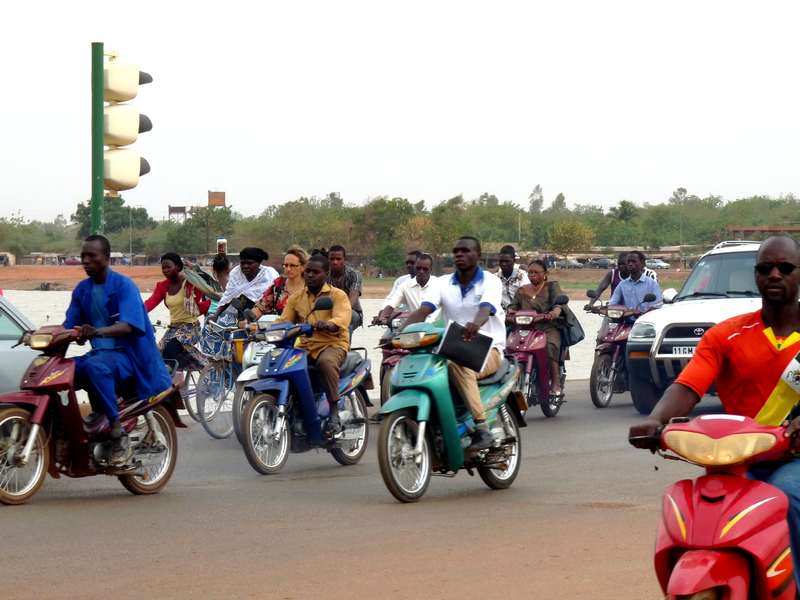
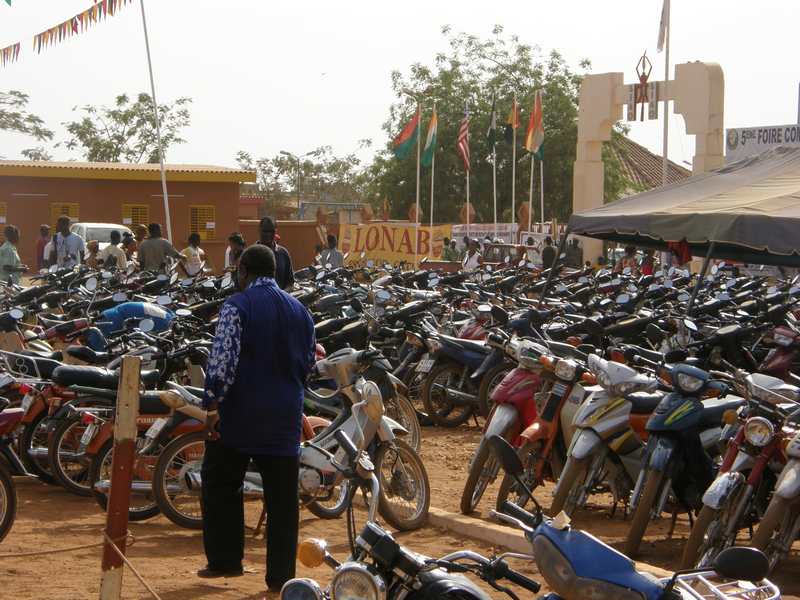 Ouagadougou morning traffic Scooter and motocycle parking lot in the city Sometimes the capital,Ouagadougou, is called ”the city on two wheels”. Indeed the number of bikes and light motorcycles in circulation is impressive. As you can see from the pictures right and left. However many of these small engines are highly polluting. It is indeed urgent to do something to reduce the pollution in Ouagadougou. The solution exists. Taking a look at China makes it obvious! A newspaper article from ”China Today” shows the way.
Ouagadougou morning traffic Scooter and motocycle parking lot in the city Sometimes the capital,Ouagadougou, is called ”the city on two wheels”. Indeed the number of bikes and light motorcycles in circulation is impressive. As you can see from the pictures right and left. However many of these small engines are highly polluting. It is indeed urgent to do something to reduce the pollution in Ouagadougou. The solution exists. Taking a look at China makes it obvious! A newspaper article from ”China Today” shows the way.
China is certainly the nation with the greatest number of electric bicycles and scooters around. Reportedly there are over 120 million, according to the site ”China Today”..
For Shi Zongdong, owner of the Valiant Horse company, there is only one worthy carrier to ride, the electric bike, which he exports. He says: ”this is the future, it is practical, clean and cheap.”
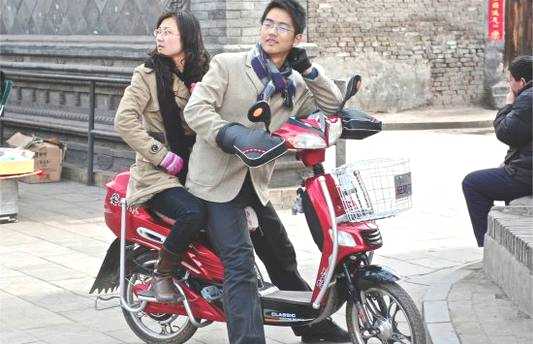
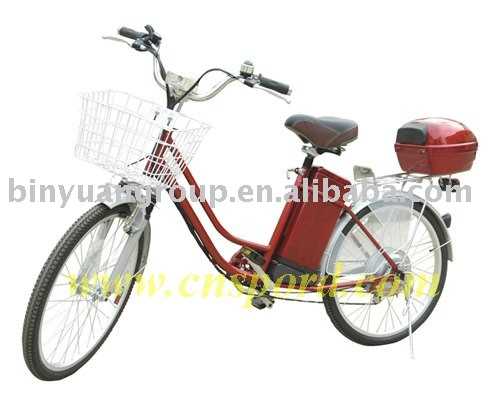 An electrical scooter in China In China alone tens of millions of people share the views of the founder of Hanma Electric Bicycles at Tianjin, 120 km from Beijing. In the past few years this vehicle seems to have been hatched through some form of spontaneous gestationt. It literally exploded since 2006, Mr Shi confirms. In the last years there has been an estimated 120 million in circulation.”I fooled the trqffic jam” one citizen of Beijing happily exclaimed as he started off at the crossroads even before the light had switched to green.
An electrical scooter in China In China alone tens of millions of people share the views of the founder of Hanma Electric Bicycles at Tianjin, 120 km from Beijing. In the past few years this vehicle seems to have been hatched through some form of spontaneous gestationt. It literally exploded since 2006, Mr Shi confirms. In the last years there has been an estimated 120 million in circulation.”I fooled the trqffic jam” one citizen of Beijing happily exclaimed as he started off at the crossroads even before the light had switched to green.
No licence plate, no drivers’ licence, no helmet required
In his shop, old fashioned and freezing cold, there are rows and rows and rows of electrically assisted bicycles, with engines like those of small scooters, capable of going at speeds of over 35 km/hour, but without the need for a licence plate or driver’s licence - a boon in a city where there are lots of severe traffic restrictions on scooters and motorcycles.
Mr Shi is nevertheless delighted that he is able to export 30 % of his production towards various Asian countries, such as India, and also to the North-American continent and the EU”. (End of quote)
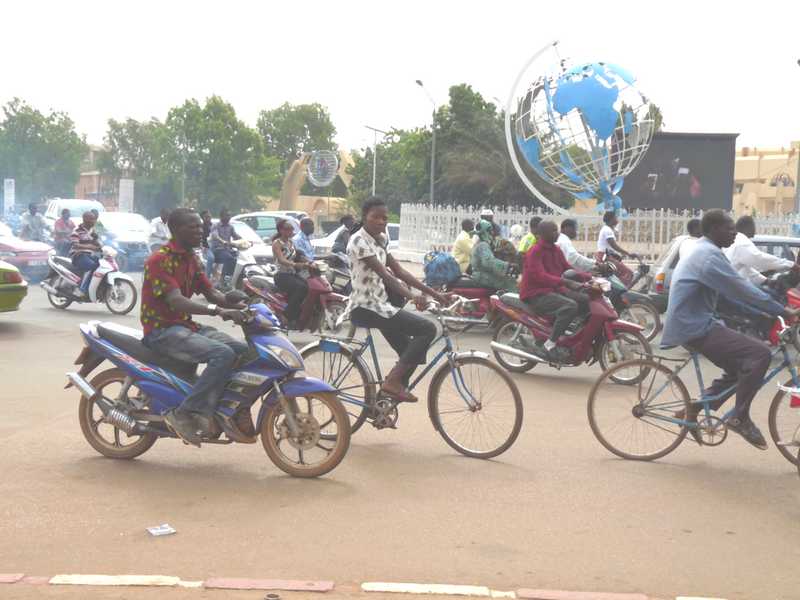
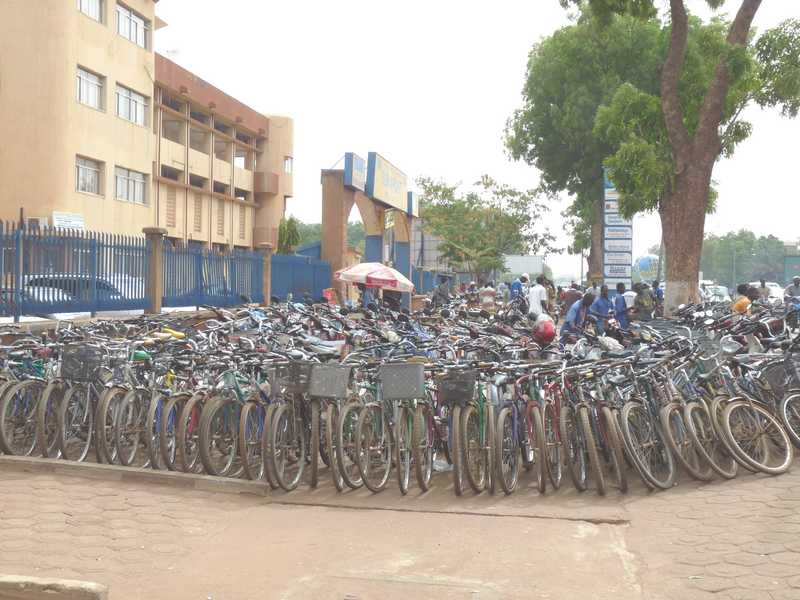 Bicycles in Ouagadougou But this manufacturer does not appear to send his bikes and scooters to Africa. They would indeed be very useful in the Sahel and notably in Ouagadougou. Besides, they are not expensive! With its lead batteries (which are heavier, but three times cheaper than the lithium, (40 € instead of 120) the bike is sold at 176€ in China. If we add to this the transport cost to Africa of 1500 dollars for a cargo of 80 bikes, the price would be 200 € on arrival. In addition there is the profit for the importer, the retailer and possible state customs duties. However, the state ought to allow this type of product free entry, because it will help reduce energy dependance and pollution. In all this would amount to 200 000 to 250 000 CFA francs for a bike (or 300 000 for a scooter).
Bicycles in Ouagadougou But this manufacturer does not appear to send his bikes and scooters to Africa. They would indeed be very useful in the Sahel and notably in Ouagadougou. Besides, they are not expensive! With its lead batteries (which are heavier, but three times cheaper than the lithium, (40 € instead of 120) the bike is sold at 176€ in China. If we add to this the transport cost to Africa of 1500 dollars for a cargo of 80 bikes, the price would be 200 € on arrival. In addition there is the profit for the importer, the retailer and possible state customs duties. However, the state ought to allow this type of product free entry, because it will help reduce energy dependance and pollution. In all this would amount to 200 000 to 250 000 CFA francs for a bike (or 300 000 for a scooter).
Further costs are very low. Recharging is identical (about 1 € per 1 000 km - the same as for a light motorcycle, using 1 litre/1000 km) and probably a bit higher in the case of an electrical scooter. But it should be noted that fuel costs are 20 times as low. Obviously batteries have to be replaced every two or three years. But the cost apparently is no higher than for the maintenance cost for an ordinary motorcycle.
If these bikes become popular outside the cities, it will be necessary to turn to solar energy. . This will probably lead to the creation of a new occupation (or at least a new service) in the villages: solar energy battery charger. Since present day solar panels now last 25 years, energy costs would not increase significantly. On the contrary, the Sahelian countries would be able to substantially reduce their energy bills.
Perhaps the time for solar energy has now come for Burkina Faso and the Sahel!
Paris, April 7th, 2011
Maurice Oudet
Director, SEDELAN









